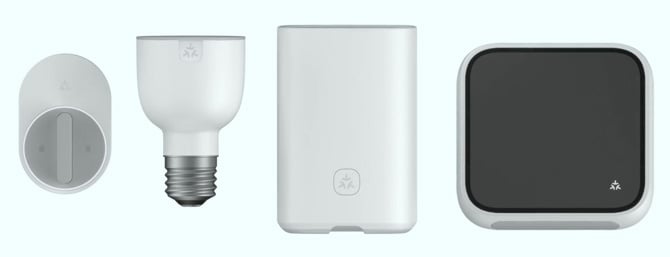You likely fall into one of three types of smart home gadget shopper: One, you're frustrated by the uncooperative bunch of smart home gadgets you've already bought that falsely promised compatibility with either Amazon's Alexa, Google Assistant, or Apple HomeKit, or with each other. Two, you've abstained altogether from the whole smart home thing fearing the "smart" gadgets would be more trouble than they were worth. Or three, or you couldn't choose between one of the three proprietary smart home ecosystems and are waiting it out to see who is left standing.
Your smart home frustrations and fears might all be alleviated by the new Matter smart home standard.
In 25 words or less, Matter makes smart home products from all makers compatible, simpler to add and use together, and collectively controllable from any smart home app.
Here's what you need to know about Matter – and if Matter matters.
1. Where did Matter come from? Who's supporting it? Is it the real deal?
Yes, Matter is the real deal.
Matter is the product of the Connecting Standards Alliance (CSA), formerly the Zigbee Alliance. Among CSA's 280 members are Amazon, Google, Apple, Samsung, which owns SmartThings, and LG with its ThinQ smart home platform. These and most other smart home ecosystem vendors, device makers, chip suppliers, etc., all cooperated in the creation of the Matter standard. To ensure wide compatibility, each Matter-certified device must support at least five smart home ecosystems.
So, yes, Matter has industry-wide buy-in from all smart home vendors, large and small.
2. What does Matter do?
Everyone admits that the smart home currently is a Tower of Babel – different devices from different companies running on different smart home ecosystems, such as Alexa, Google Assistant, and HomeKit, speak in different code languages and can't or won't talk to one another.
Matter solves these digital communication problems by creating a universal smart home command, control, and connectivity language so Matter-compatible apps and devices all understand what each of them is saying.
In more practical terms, Matter defines common control commands for devices in specific smart home device categories. More importantly, Matter defines codes for basic functions such as:
- initial pairing to a smart home ecosystem (Alexa, Google Assistant, HomeKit) or to the device maker's own app
- on/off control
- device-to-device communications so you can create a string of multi-device actions, what some smart home vendors call "scenes" or "routines," that include heretofore incompatible devices
3. Which smart home devices are Matter compatible?

Matter version 1.0 provides standardized coding compatibility for:
- blinds & shades
- door locks
- garage door openers
- lights & lighting
- sensors (security, motion, contact, air quality)
- smart hubs & bridges
- smart plugs
- smart TVs (casting, notifications)
- thermostats
- wireless access points
CSA is currently working on adding additional product categories in future versions of the Matter specification, including security cameras, home appliances, smoke and carbon monoxide detectors, doors and gates, environmental quality sensors and controls, ambient motion and presence sensing, and advanced energy management.
4. Do I have to buy all-new smart home products?
No. Nearly all current smart home devices from CSA member companies should be able to be updated to become Matter compatible. For instance, Amazon announced that 17 of its Echo smart speakers were updated to be Matter compatible, and Google announced that all Google, Nest, and Android devices would be upgraded to Matter.
Depending on the manufacturer, Matter updates will be automatic in the background – you won't even know it happens – or you'll be prompted to upgrade your app or device firmware or software, or you'll have to check your device app's software/firmware settings to update manually. You should be doing this anyway to ensure your device is as up-to-date as possible.
5. Do I have to update my smartphone?
Yes and no.
Apple added Matter compatibility with iOS 16.1, released in mid-October 2022, and any iPhone from iPhone 8 forward can be updated to iOS 16.x. So you will have to update your iPhone to iOS 16.
For Android Matter compatibility, you need a phone or tablet running at least Android OS 8.1 – so pretty much any Android phone or tablet bought in 2017 or later – and Google Play Services version 22.48.14 (to update Google Play Services, go the Google Play app, tap your profile icon in the upper right, select Settings > About > Play Store version. If an update is available, it will automatically download and install)
6. How do I know if a smart device is Matter-compatible?
All new Matter-compatible product packaging will bear the new Matter "mark" – three arc-tipped arrows pointing inward – and a brand logo, just the word "matter" in a sans serif font. Either the Matter mark or logo will likely be more visible on product boxes than other compatibility marks or logos from Amazon, Google, Apple, et al.

To find out if your existing smart home device is Matter compatible, you can search the CSA Certified Product Search web page. First, scroll down to "Program Type" and check the "Matter" box. You can then search by keyword or filter results by device type or company.
7. How many Matter products are there, or will there be?
At this writing, there were nearly 280 Matter-certified devices. However, this year, we expect a huge rollout of new Matter devices, as well as companies hurriedly updating their existing product and apps.
8. How do I set up a Matter device with my smart home control app?
The whole idea behind Matter is to make it easier to get smart home devices up and running faster.
First, you can use either the device maker's own smartphone app to control your smart home or use a smart home ecosystem app, including those for Amazon Alexa, Google Assistant, and Apple HomeKit.
All Matter devices are required to include a QR code, which you simply scan using your smartphone's camera to quickly pair your Matter device to your chosen smart home control app. However, Matter device makers also can include other pairing methods such as Bluetooth, a numerical code, or near field communication technology (NFC) – the way you pair AirPods to your iPhone. Matter may also automatically detect a new smart home device as soon as you plug it into a power source.
You can watch a Matter setup video demo here.
9. Can I use multiple control apps?
Yes, you aren't limited to controlling your device via a single smart home ecosystem. If some folks in your home like saying "Alexa…" rather than "Hey, Google!" or "Hey, Siri!" you can pair your smart home devices to different control apps, a capability the Matter folks refer to as "multi admin." "Sharing" a Matter device in a different control app will be done via that app's settings, but how this device sharing is accomplished will differ from device to device and app to app.
However, you won't be able to share your multi-action "scenes." If you pair your Matter devices to a second control app, you'll have to build these "scenes" again.
10. How secure is Matter?
The CSA people have been adamant that it has made Matter as secure as possible.
Primarily, Matter uses blockchain – the same secure system used by bank and smartphone payment systems such as Apple Pay when you bank or pay wirelessly – to securely validate devices when you pair them to your control app. And each Matter device is required to generate its own secure digital identification "certificate."
Also, unlike some smart home devices or systems, all Matter commands and control code transmissions are confined to your presumably secure local WiFi network; some smart home devices send commands up to the cloud and then back down to your home, a connection that is both slower and more vulnerable. Additionally, all Matter command and control systems transmitted by, to, and from your smartphone or device are encrypted.
Matter's Future
The $64,000 question is whether Matter will materially change how easy or hard it is to set up and use smart home devices.
Matter-compatible products are just now rolling out in quantity. As control apps and existing smart home products get updated, and as we get Matter-compatible products in for testing, we'll let you know just how much easier the whole Matter business is.
What we can report is that smart home device makers no longer have to restrict their devices to conform to specific smart home ecosystems. As a result, Matter will enable more companies to produce more and better smart home products that will be compatible with any other smart home apps or devices you currently own.
[Image credit: Connecting Standards Alliance]
Stewart Wolpin has been writing about consumer electronics for more than 35 years, including news, reviews, analysis, and history, and has attended and covered nearly 50 Consumer Electronic Shows and around a dozen IFA shows in Berlin. For the Consumer Technology Association (CTA), he is an elector for and writes the official biographies of the annual CT Hall of Fame inductees, and is the keeper of the industry’s official history.














